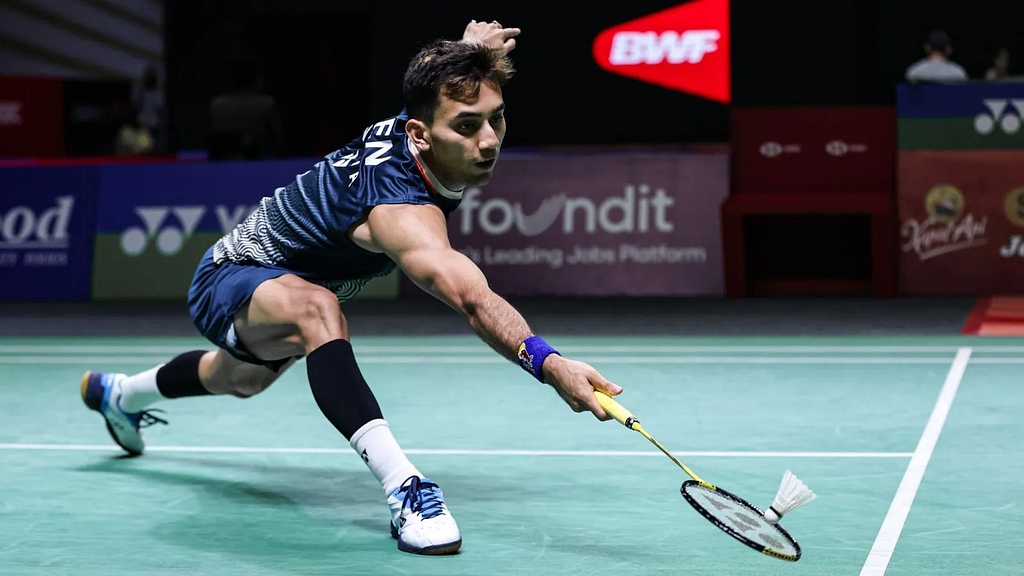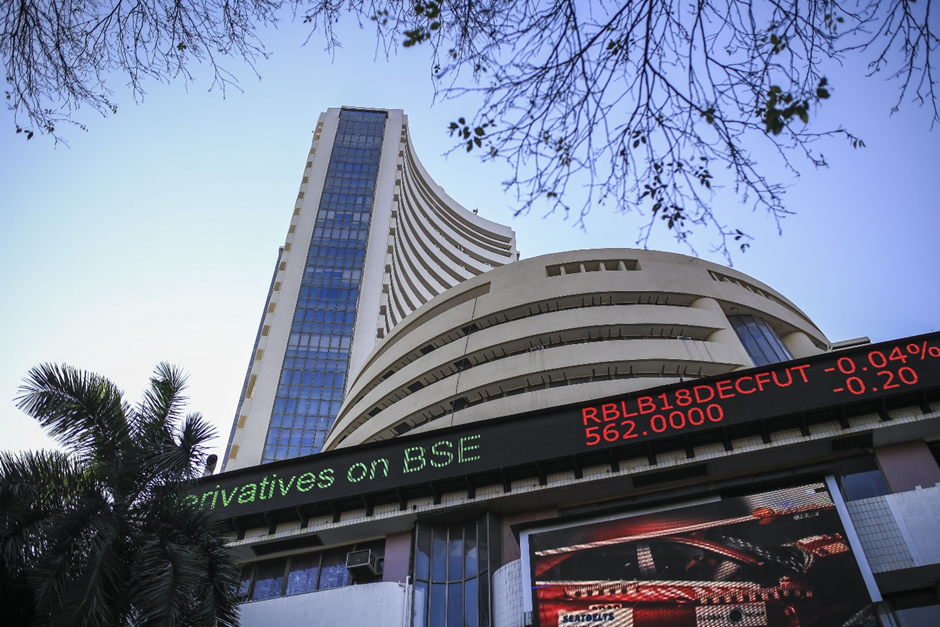
From Classrooms to Podiums: Bharat’s Quest for Gold
In Frame: Ace Indian Shuttler Lakshya Sen in Action
India, a nation of 1.4 billion people, stands at a pivotal moment in its sporting history. Despite its vast population and growing economic clout, the country has long struggled to make a significant mark on the global sporting stage. However, a seismic shift is underway in India’s approach to sports, driven by a confluence of demographic trends, conducive business paradigms, and innovative educational models.
As the nation aims to harness its demographic dividend, India has the potential to emerge as a sporting powerhouse. From the vibrant playgrounds of urban schools to specialized academies dedicated to nurturing elite athletes, the multifaceted ecosystem of sports education is reshaping the future of sports in the country.
India Has a Very Large Adolescent Population in Their Ripe Sporting Age
Source: IMF World Economic Outlook Database October 2019 and World Population Review
India is home to the world’s largest youth population, with approximately 253 million adolescents aged between 10–19 years, representing nearly 20% of the country’s total population. This substantial youth cohort falls within the prime age range for sports training and development, offering unprecedented potential for cultivating a robust sporting culture and achieving excellence in various athletic disciplines.
This demographic advantage is further underscored by the fact that the median age in India is just 28.4 years, compared to 38.1 in China and 48.4 in Japan. The National Youth Policy of India recognizes sports as a key area for youth development, aiming to increase youth participation rates from the current estimated 5–10% to at least 20% by 2030.
Interest in Professional Sports Has Been Increasing in India in Recent Times
In Frame: Indian Super League 2023–24
The landscape of professional sports in India has changed remarkably in recent years, with a surge in participation and viewership across various disciplines. The transformation of sports from a hobby to a respected profession in India has been profound. Various factors have contributed to such shifts:
Increased Investment in Sports Infrastructure: The Indian sports fraternity has seen the construction of top-notch training facilities, sports academies, complexes, renovation of stadiums, etc., and other prominent infrastructure developments.Emergence of Professional Leagues: The phenomenal success of the Indian Premier League (IPL) in cricket, has led to the inspiration behind the creation of similar league formats in other sports, such as Pro Kabaddi League, Indian Super League, etc. Such leagues have given athletes stable incomes through large contracts.Corporate Sponsorships and Endorsements: The growing capital deployment by corporate sponsors has transformed the financial dynamics of the sports industry. There has been an upward trend in corporate endorsement opportunities and sponsorship deals, elevating the status of athletes and making sports a lucrative profession for many.Media Coverage and Digital Platforms: As reported by a FICCI-EY report, online sports viewership in India grew by 30% in 2019, with over 300 million viewers watching sports online. The accessibility of sports for the general public has increased driven by extensive media coverage including sporting events, live broadcasts, and the growth of digital media.Source: IBEF
Sports as a profession in India has been on a growth trajectory driven by a combination of government support, corporate investment, and increasing public interest. This burgeoning interest in professional sports is not only creating new career opportunities for athletes but also fostering a culture of sporting excellence in the country.
Despite These Tailwinds, India’s Performance Across Global Tournaments Has Remained Below Potential
In Frame: Indian Track and Field Athlete Neeraj Chopra in Action
India’s sports story is one of unfulfilled promise, a tale of a sleeping giant yet to awaken fully. Despite its humongous population and rising interest in sports, India often finds itself in the shadows when the global spotlight shines on international arenas.
In the recently concluded Paris Olympics 2024, the 117-member strong Indian contingent was expected to achieve a double-digit medal count including multiple gold medals, however, that story didn’t pan out in the same fashion.
Source: The Economic Times
This is in contrast to the powerhouse performances of Indian teams across non-Olympic sports like cricket and kabaddi, where the Indian contingent is seen as a force to be reckoned with. This paradox stems from a perfect storm of challenges.
Inadequate sports infrastructure remains a significant barrier, with only 3.5% of schools having proper playground facilities, limiting access to quality training. Additionally, there is insufficient grassroots development, as the lack of a structured talent pipeline hinders the identification and nurturing of young athletes.
Societal and cultural factors also play a role, as many talented individuals come from underprivileged backgrounds with limited access to training and nutrition, compounded by a cultural emphasis on academic achievement over sports.
The historical focus on cricket has led to a disproportionate allocation of resources, neglecting other sports in terms of funding and media attention. Governance issues further exacerbate the situation, with bureaucratic hurdles and mismanagement within sports federations resulting in inadequate support for athletes. The result is a nation rich in raw talent but lacking the systematic nurturing required to transform potential into world-class athletic achievements.
Several Trends are Shaping Up in India’s Sports Education Market Aimed at Addressing This Gap
In Frame: Indian Football Team
India’s sports education market is undergoing a significant transformation, driven by a confluence of public and private initiatives aimed at addressing historical gaps in athlete development and training at the grassroots as well as professional levels.
Launch of Marquee Government Initiatives
The Indian government is actively promoting sports education through various policies and programs, with the Ministry of Youth Affairs and Sports (MYAS) playing a pivotal role in this development. Collaborating with the Sports Authority of India (SAI), the ministry focuses on providing essential infrastructure, training, and resources to enhance athletic performance. The National Sports Federations (NSF) ensure that sporting events are well-organized and supported, while the Indian Olympic Association (IOA) oversees the country’s participation in international competitions, including the Olympics.
Khelo India Scheme: Launched to promote sports around the nation to promote the culture of sportsmanship and achieve sports excellence. Through Khelo India, several significant sports development initiatives are being carried out such as the establishment of the Khelo India State Centre of Excellence in 29 states/union territories, over 250 sanctioned infra projects, support for more than 700 Khelo India District Centers, and identification of over 2,800 athletes with provision for pocket allowance and other forms of support.Target Olympic Podium Scheme: Launched to enhance India’s performance at the Olympics and Paralympics. To enable medal-winning athletes to perform well at the Olympics, the goal of the scheme has been centered around giving the highest priority to training the athletes. Around 47 of the medal-winning athletes in the Commonwealth Games were funded through the TOPS program.Fit India Movement: Launched by PM Narendra Modi to integrate fitness as a daily routine in the citizens’ lives. Several initiatives were launched under the same such as the FIT India Mobile App, FIT India Quiz, FIT India Freedom Run, FIT India School Week, and FIT India Freedom Rider Biker Rallies.
Growth of Sports and PE Focused Startups Catering to Schools
In Frame: Edusports/Sportz Village, India’s #1 Sports Education Organization
The last decade has seen the rise and growth of several startups focused on providing structured physical education and sports training, catering specifically to schools. Changing attitudes amongst school leaderships, and a system shift towards embracing the idea of having sports as a vital part of a holistic education offering has led to the growth of companies in this space.
These companies are addressing the growing need for structured sports education, enhancing the physical well-being of students while also fostering life skills like teamwork, leadership, and discipline. By partnering with schools, they provide expert coaching, curriculum development, and sports infrastructure, filling a critical gap in traditional school education systems. This has also led to the adoption of innovative approaches like 12-point measurement systems for children to help the school and parents track progress individually.
EduSports is a pioneer in the field of structured physical education and sports programs in India, offering schools a comprehensive curriculum designed to improve students’ fitness levels, motor skills, and sports participation.KOOH Sports focuses on providing a comprehensive sports education platform in schools, blending physical activity with education through scientifically designed sports programs that aim to develop athletic skills from a young age.Founded by former cricketer Anil Kumble, Tenvic delivers sports education and training programs to schools, emphasizing the development of both physical skills and character-building attributes such as leadership and teamwork.LeapStart offers an internationally benchmarked physical education curriculum, based on the SPARK program from the USA. Their programs focus on developing physical literacy and encouraging lifelong fitness habits through a mix of PE activities, games, and sports.Sportseed provides a range of services, from setting up sports academies within schools to organizing inter-school sports events, with a strong emphasis on inclusivity and broad-based participation in sports.
Rise of Privately Funded Sporting Academies
In Frame: Lakshyan Academy of Sports
In many larger cities, there has been a mushrooming growth of sporting complexes and academies catering to the youth. Some of these academies are high-performance academies equipped with state-of-the-art facilities and world-class coaching to nurture young talent and groom future champions.
Many corporations as well as individuals have established specialized academies that cater to specific sports and focus on excellence in chosen fields and formats. Some of these academies have also trained many Indian Olympians and athletes winning national and international accolades.
In Frame: JSW Inspire Institute of SportsEstablished by the JSW Group in Bellary, Karnataka, the Inspire Institute of Sports is a state-of-the-art training facility dedicated to nurturing elite athletes in sports like wrestling, boxing, judo, and athletics, providing them with world-class coaching, sports science support, and international exposure.Lakshyan Academy of Sports in Bangalore specializes in training young athletes in sports such as badminton, tennis, and football, offering top-tier coaching, modern facilities, and a focus on developing both technical skills and competitive mindsets to help athletes excel at the national and international levels.Located in Bangalore, the Padukone Dravid Centre for Sports Excellence is a multidisciplinary sports facility that provides high-quality training in sports like badminton, cricket, tennis, and swimming. It aims to create a conducive environment for young athletes by blending rigorous training with academic support.Founded by Olympic shooter Gagan Narang, Gun for Glory is a premier shooting academy with multiple branches across India, offering advanced training in shooting sports.
Emergence of Sports-Focused Formal Education Institutions
In Frame: The Sports School, Bangalore
In recent times, multiple institutions have emerged across both K-12 and higher education, that operate with a distinctive focus on sports. These institutions offer a balanced curriculum that integrates rigorous academic education with intensive sports training, providing students with the resources and guidance needed to excel both academically and athletically.
Furthermore, by embedding sports within formal education, these institutions help inculcate discipline, teamwork, and leadership skills, preparing students for diverse career paths within and beyond the sports industry.
In Frame: Sports-Focused Formal Education Institutions in IndiaThe Sports School is a modern sports-focused school in Bangalore that integrates academics with professional sports training across multiple disciplines.Delhi Sports School, under the Delhi Sports University, is a state-of-the-art institution in Delhi, combining academic education with high-quality sports training to develop future athletes.Established with the goal of nurturing sports talent in Uttarakhand, Maharana Pratap Sports College offers a range of sports disciplines with dedicated facilities and experienced coaches, helping students achieve excellence in both sports and academics.Guru Gobind Singh Sports College is a prestigious sports institution in Uttar Pradesh, offering specialized coaching in various sports alongside academic education.Founded by Indian cricketer Virender Sehwag, the Sehwag International School combines quality education with sports training, emphasizing cricket as well as other disciplines.
These initiatives demonstrate a multi-faceted approach to improving sports education in India, combining efforts from the government, private sector, and educational institutions. The impact of these trends can be multidimensional and will affect the entire capability development lifecycle of an athlete, thereby, helping to create a pipeline of globally competitive athletes for India.
India’s Sports Education Market is Poised for Transformative Growth Driven by Various Factors
Sports education in India has gained significant momentum in recent years. The National Education Policy 2020 has emphasized the importance of integrating sports into the school curriculum, aiming to foster holistic development among students. Several growth drivers are fueling the rise of sports education in India:
Increased Investment and Corporate Sponsorships: There is a growing trend of corporate investments in sports, other than cricket, which is essential for the financial sustainability of sports education and infrastructure. Sponsorship deals are becoming more common and there has been a growing number of private sports academies and training centers, with companies like JSW taking the lead.Government Initiatives and Support: The Indian government’s proactive stance on supporting the growth of sports in the country has led to the launch of several marquee initiatives such as the Khelo India Program and the Target Olympic Podium Scheme. The government also increased the budget allocation for sports which rose by 11.08% in FY23.Rising Number of Sports Startups: The role of technology in sports has seen a paramount increase with the rise of several prominent sports startups like Playo, which are increasing the penetration and accessibility of sports in India, leading to the growth and maturity of the overall market.Expanding Middle Class and Disposable Income: India’s middle-class population is expected to expand to 580 million by 2025 according to the World Economic Forum. There is an increased willingness to invest in children’s sports education by parents, leading to reduced dropouts during training phases.Growing Awareness and Cultural Shift: There has been a noticeable shift in cultural perceptions towards sports, with more families encouraging their children to pursue sports as a viable career. Schools have been working on integrating sports into the curriculum for overall development. Success and promote sports as a respectable profession.Expansion of Sports Leagues and Media Coverage: The emergence of several new professional leagues across the spectrum of sports has led to increased visibility and popularity of various sports beyond cricket. These leagues have created role models encouraging higher youth participation.
As India stands on the cusp of a sports revolution, the path forward is both challenging and filled with promise. The convergence of a youthful population, increasing interest in sports, innovative educational models, and growing investment presents an unprecedented opportunity for transformation.
The coming decades may well see India translating its demographic dividend into sporting gold, reshaping its future in international sports.
LoEstro Advisors is an investment banking firm specializing in sell-side fundraising and M&A advisory, along with a strong consulting arm. Recognized as the #1 financial advisor in education in India, we are the advisor of choice to India’s blue-chip education businesses.
Over the last four years, we have grown to be one of India’s largest (in terms of M&A transactions) homegrown boutique investment banks, with $1.2bn+ worth of combined deals closed across education, healthcare, consumer, and technology sectors.

